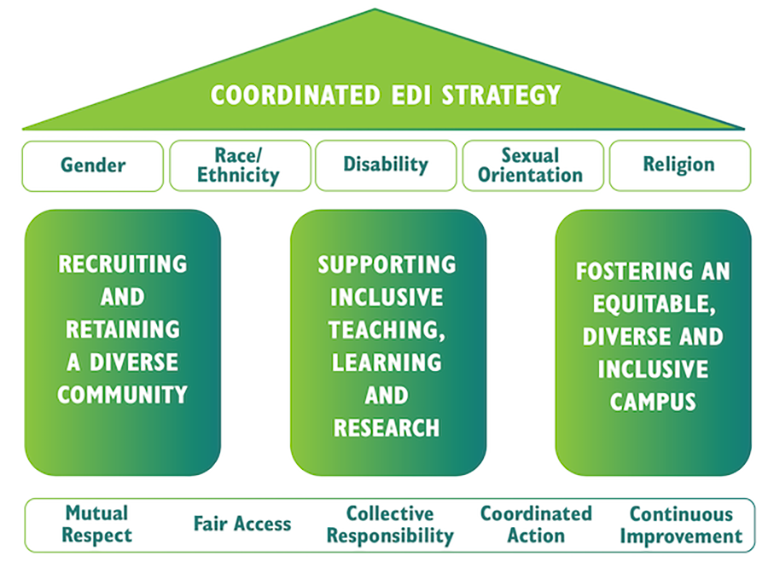Concordia releases its Report of the Working Group on Equity, Diversity and Inclusion

Today, following a two-year, two-phase, university-wide consultation process, Concordia released the Report of the Working Group on Equity Diversity and Inclusion.
“This multi-year undertaking reflects a vision to see underrepresented members of our community not only reflected, but welcomed, included and supported to make contributions in all areas of university life where we teach, learn, work and convene,” says Anne Whitelaw, interim provost and vice-president, academic.
“This work is not going to be simple, and it is going to take time. But it is essential to further improve who we are as a community. We are not alone on this journey. We are among leading universities worldwide who are hard at work ensuring that their institutions are truer reflections of the larger society in which they are rooted, and includes people with disabilities, Indigenous peoples, members of racialized and faith-based communities, and spans sexual orientations and gender identities.”
The final report closes the work of the advisory and working group on EDI and provides a point-in-time reference on EDI perceptions and work underway. It also highlights gaps, barriers and opportunities.
Recommendations across three pillars that address five key areas
The working group on EDI organized its recommendations into three pillars that address five areas of discrimination and harassment reported by members of our community during the consultations.
Recommendations across three pillars
- Recruiting and retaining a diverse community
- Supporting inclusive teaching, learning and research
- Fostering an equitable, diverse and inclusive campus
Addressing five areas of discrimination and harassment
- Gender
- Race/ethnicity
- Disability
- Sexual orientation
- Religion
The report summarizes the process and what was heard from Concordians. It also creates a framework for a coordinated EDI strategy across the university, including guiding principles and recommendations to build our commitment to EDI.

“I want to extend a very special thanks to Lisa Ostiguy, special advisor to the provost on campus life, and to members of the advisory group and working group for their work that led to the creation of this report. Lisa’s unique understanding of human dynamics and her leadership of these critical initiatives will benefit current and future students, staff and faculty,” says Whitelaw.
“I also congratulate Lisa as she begins her new role as special advisor on campus life and supports. Working with offices and stakeholders across the university, she’ll provide students and faculty with coordinated assistance and a range of supports in navigating challenging and complex situations, with a particular focus on accessibility.”
Ostiguy’s role will specifically address issues that require cross-collaborative efforts, including obtaining input and harmonization across university offices. Her role in creating a more accessible campus will extend to developing and updating policies as the university continues to learn and further improve the supports and processes to welcome all members of the university community. Finally, she will provide support to the parents of students in exceptional and difficult situations.
“The report reflects the voices of Concordians who answered our calls for feedback and lent their support by participating in our many on-campus and online events held over the past two years,” says Ostiguy. “It’s a university-wide snapshot of where we are, where we need to be and how we can get there together as a community.
“I’d like to congratulate members of the advisory and working group on Equity, Diversity and Inclusion on the release of the report as it would not have been possible without their valuable insight and contributions,” she says.
Next steps: Equity Office to articulate recommendations into an action plan
The Equity Office will coordinate and harmonize next steps, including managing EDI resources and initiatives across the university and overseeing the rollout of an EDI action plan.
The office’s mandate includes addressing systemic discrimination by working in partnership with the Indigenous Directions Leadership Council, Black Concordia Caucus, President’s Task Force on Anti-Black Racism and the Centre for Gender Advocacy.
2018-2020: Looking back
Phase one: the 2018-19 advisory group identified EDI priority areas
In fall 2018 work began with the formation of a 14-member advisory group that included students, staff and faculty who were selected following a well-publicized call for members.
The group hosted events on both campuses in order to hear from individuals and stakeholder groups on what works, what needs improvement and priority areas to advance EDI.
The report issued by the advisory group reflects the community feedback received during events. These included consultations, structured interviews, ethnographic listening, IDEAS Cafés and creative consultations that employed the use of listening pods installed in the atriums of high-traffic university buildings.
The advisory group released its report in fall 2019.
Phase two: the 2019-20 working group confirmed priority areas and drafted final recommendations
The first of 30 working group meetings was convened in fall 2019 and shortly after the 12-member group set out to validate the findings contained in the phase one report.
Over twelve months, the group cast a wide net in order to hear from as many Concordians as possible.
The range of listening activities included a university-wide survey, organizing an EDI conversation week, several stakeholder consultations, open opportunities to submit feedback, and the rollout of a three-phase consultation process. This included an information session, an opportunity to prioritize recommendations through the use of a questionnaire and six consultation sessions with university stakeholders.
The working group issued its final report in November 2020.
Learn more about the Report of the Working Group on Equity Diversity and Inclusion.




